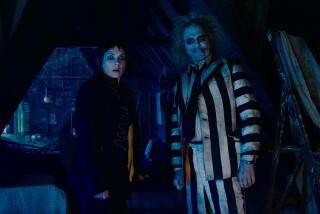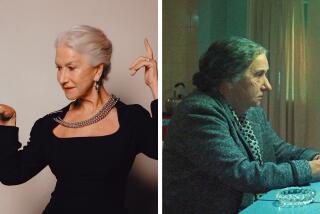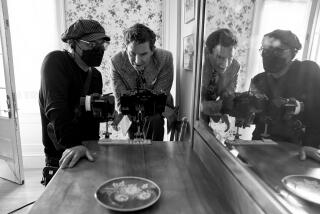Reality gets shortchanged in movies
- Share via
Only in the movies does everybody take their coffee “black.” And people are always saying “keep the change” when they buy something.
Where else do you see people take aspirin without water? Or look over their shoulder while driving to see if the car chasing them is catching up?
Movies are full of this stuff, allegedly everyday human behavior that isn’t, really. They’re called “movie shortcuts.”
The truth is, the majority of human beings take milk and/or sugar with their coffee. Or artificial sweetener or creamer. In the real world, the serving of coffee cannot be consummated without a brief Q&A.; But moviemakers are impatient with incidental dialogue, so the coffee ritual is out.
The same goes for beer. A man walks into a bar and orders “a beer,” which the bartender quickly serves him. Never mind the brand or whether he’d prefer a draft or a bottle.
When the customer pays for the beer, he never wants any change. I’m not talking about leaving it on the bar but pointedly refusing to take it: “Keep the change.” That phrase is all over the movies, for it eliminates change-making, which might slow down the story for 10 seconds. For me, the story stops when a guy tells a 7-Eleven cashier to keep the change.
That is the problem with movie shortcuts. Sometimes they’re so glaring that they snap you out of immersion in the movie. That happens to me whenever a driver in a car chase looks over his shoulder at his pursuer. Why is he not looking in his rear-view mirror?
This is not the only problem with cars and driving in the movies. Have you noticed that when movie characters go on a long trip, they’re always on picturesque back roads? In “Transamerica,” they go from New York to New Mexico without using the boring interstate.
A hit man can sit in a shiny black BMW sedan on a suburban street for hours, waiting for his target, without anyone questioning what he’s doing there.
One more thing: seat belts. Movies are stuck in the 1950s, when people jumped into their cars and drove away. We still see that worn-out gag in which the driver peels out and almost hits something, after which the passenger nervously buckles his belt.
Let’s talk telephones. Movie character behavior on the phone bears no resemblance to real life. For one thing, nobody ever says “Goodbye.” They just hang up, which is actually rude. Sometimes they don’t say “Hello,” either. Instead it’s, “Yeah?”
Listen closely when the disembodied voice on the phone hangs up. Is that a dial tone? Since when do you get a dial tone in that situation?
Here are more things you’ll see only in the movies:
* Smoking. The movies represent the last bastion of cigarette smoking in America, where the habit has been in decline for years. But movie characters live in an alternate universe where the tobacco industry won the war. Nonsmokers are rare.
* Mirrors. People in movies are always studying themselves in the mirror, thinking deep thoughts. In real life, periods of introspection take place without mirrors. How often have you gone to the sink, splashed cold water all over your face, then stared into the mirror?
* Potholders, lack of. A saucepan on the stove starts to boil over, the panicky guy grabs the handle with his bare hand, yelps in pain and drops everything, making a huge mess. In real life, even the most kitchen-impaired man knows better.
*
Larry Williams is a staff writer at the Hartford Courant, a Tribune company.
More to Read
Sign up for The Wild
We’ll help you find the best places to hike, bike and run, as well as the perfect silent spots for meditation and yoga.
You may occasionally receive promotional content from the Los Angeles Times.






